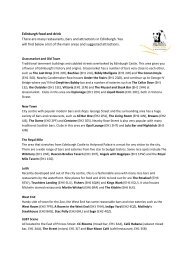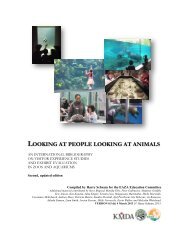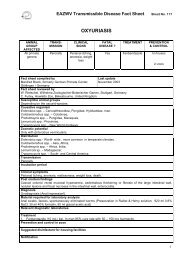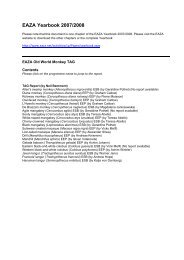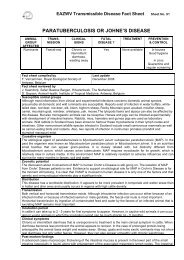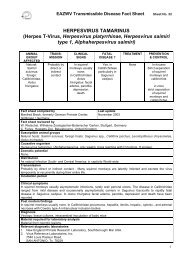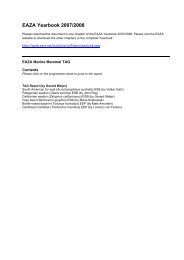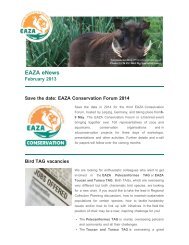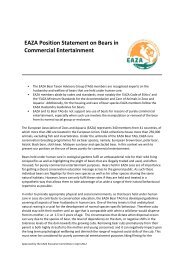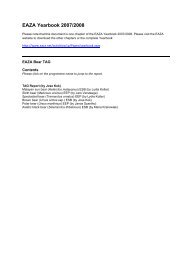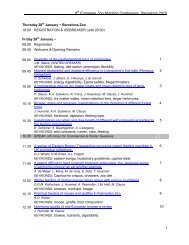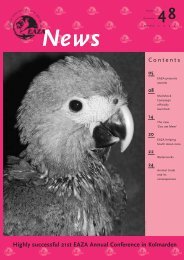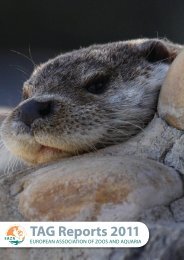EAZA News 57-12 - European Association of Zoos and Aquaria
EAZA News 57-12 - European Association of Zoos and Aquaria
EAZA News 57-12 - European Association of Zoos and Aquaria
Create successful ePaper yourself
Turn your PDF publications into a flip-book with our unique Google optimized e-Paper software.
Chris Peters<br />
Position Zoo educator at Rotterdam Zoo <strong>and</strong> past IZE president<br />
Favourite animal Elephant<br />
Favourite sustainable(!) exhibit The Oceanium at Rotterdam Zoo<br />
with its solar ro<strong>of</strong>, which probably is the biggest solar ro<strong>of</strong> in a<br />
<strong>European</strong> zoo<br />
Hobbies Working for IZE <strong>and</strong> hiking with family<br />
Please describe your career path.<br />
In 1976 I wrote a letter to the director <strong>of</strong> Rotterdam<br />
Zoo, the well-known Dick van Dam, informing him<br />
I desperately wanted to work for the zoo. Fortunately,<br />
he was not at all discouraged by the fact that I am<br />
disabled. In fact, he told me that he wanted me to work<br />
for the zoo no matter what problems had to be solved to<br />
realise that. I started setting up an animal information<br />
system for the zoo keepers. In 1983 Bert de Boer,<br />
current <strong>EAZA</strong> chair, started to organise a modern<br />
education department, after which I became a zoo<br />
educator, with my main task being to produce education<br />
panels. Later I became involved with educational<br />
aspects <strong>of</strong> developing new enclosures. Rotterdam Zoo<br />
really st<strong>and</strong>s out in integrating education; our educators<br />
are involved in zoo design, collection planning <strong>and</strong> even<br />
in the zoo management.<br />
What is the most memorable or fascinating event in your<br />
career so far?<br />
Probably my involvement with the International Zoo<br />
Educators (IZE). In 1992 the former head <strong>of</strong> education<br />
wanted me to go to the IZE Conference in Sydney.<br />
At first, I thought he was joking, as because <strong>of</strong> my<br />
h<strong>and</strong>icap I had never travelled that far abroad.<br />
Nevertheless, I ended up in Australia <strong>and</strong> became<br />
fascinated by the inspiring cooperation <strong>of</strong> the IZE. As<br />
I really missed the contribution <strong>of</strong> zoo educators from<br />
developing countries, a few years later I started to assist<br />
the IZE in getting these colleagues on board. Thanks<br />
to funds <strong>of</strong> the Dutch Ministry <strong>of</strong> Foreign Affairs we<br />
managed to finance the attendance <strong>of</strong> one African <strong>and</strong><br />
two South American educators to the IZE Conference in<br />
Copenhagen, 1996.<br />
Besides being a dedicated zoo educator, what other activities<br />
do you have within the zoo world?<br />
I have to mention IZE again. After the IZE Conference<br />
in 1996, I became the regional representative <strong>of</strong> Europe,<br />
Africa <strong>and</strong> the Middle East. One <strong>of</strong> my first actions was<br />
to split up this enormous region; I assisted the African<br />
participant <strong>of</strong> Copenhagen Zoo, Peter Micheni, in setting<br />
up the AZOREN (African Zoo <strong>and</strong> Reserve Educators<br />
Network). In 2000 I became the ‘president elect’ <strong>of</strong> IZE,<br />
to become president in 2003 <strong>and</strong> 2004. Last year was my<br />
final year in the assisting function as past president.<br />
What are the main challenges for the IZE president?<br />
During my presidency, my main goal was to pr<strong>of</strong>essionalize<br />
the structure <strong>of</strong> IZE; it now has a permanent <strong>of</strong>fice in<br />
Bern, Switzerl<strong>and</strong>, which makes the organisation more<br />
stable. Other challenges are to achieve a good cooperation<br />
with WAZA <strong>and</strong> regional zoo organisations like <strong>EAZA</strong>.<br />
Currently, we are the <strong>of</strong>ficial education organisation under<br />
the umbrella <strong>of</strong> WAZA. Furthermore, I would like to see<br />
more educational input in the Conservation Breeding<br />
Specialist Group (CBSG).<br />
You helped organise the 18 th IZE Conference in 2006. What<br />
did you see achieved through the conference, focussing on<br />
the United Nations’ Decade <strong>of</strong> Education for Sustainable<br />
Development?<br />
During an ‘open space activity’ we gathered a lot <strong>of</strong><br />
concrete suggestions for sustainable education.<br />
Nevertheless, the most important message that popped<br />
up was that we should invest more in evaluating our<br />
education. The sustainable message is important,<br />
but do we succeed in getting it into the minds <strong>of</strong> our<br />
visitors? IZE will focus on better evaluation tools to<br />
make our sustainable message more successful. •<br />
interview<br />
“ We are not only spreading the message,<br />
we are the message. By acting green<br />
<strong>and</strong> telling about it, hopefully we will<br />
be able to create awareness <strong>and</strong> change<br />
the lifestyle <strong>of</strong> our visitors”.<br />
eaza news <strong>57</strong><br />
2007<br />
09



